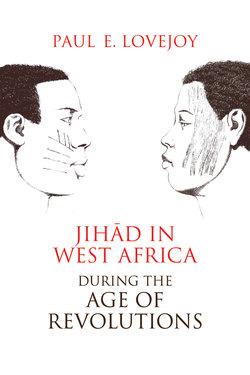Читать книгу Jihād in West Africa during the Age of Revolutions - Paul E. Lovejoy - Страница 11
На сайте Литреса книга снята с продажи.
ОглавлениеGLOSSARY
ajami—Languages other than Arabic written in Arabic script
al-ḥājj—Honorific title for someone who has performed the pilgrimage to Mecca
alkali (Hausa)—Judge
Bilād al-Sūdān—Land of the blacks, that is, sub-Saharan Africa and specifically the Sahel and savanna
birni (Hausa)—Walled town
bori (Hausa)—Spirit-possession cult
caffa (Hausa)—Land grants based on clientage
ceddo—Warlords, military governments of the western Bilād al-Sūdān
diwal—Provinces of Fuuta Jalon
fadama (Hausa)—Irrigated land
Fulani (Hausa)—Fulbe
gandu (Hausa)—Plantation, depending on context; land worked collaboratively on the basis of kinship
gona (Hausa)—Farm
Ḥadīth—Oral traditions of the Prophet Muhammad
hijra—Flight, withdrawal of the Muslim community to a sanctuary
hurumi (Hausa)—Land grants based on clientage
imām—The leader in prayer at mosques; by extension, the leader of the Muslim community
jamāʿa—Muslim community
jihād—Muslim holy war
ribāṭ—Fortified town, often on a frontier
rinji (Hausa)—Plantation
rumde—Slave estates, plantations; also rimaibé
salafi—Adherence to strict interpretation of Islamic law and rejection of innovation
sarki (Hausa)—King, chief; but when used with a specific title, sarkin, as in sarkin gandu
sarkin bori (Hausa)—Chief of the bori spirit possession cult
sarkin gandu—Overseer of a plantation, i.e., “chief of the gandu,” i.e., plantation
Sayfawa—The dynasty of Borno
Sharīʿa—Islamic law
shurfa—Claiming descent from the Prophet Muhammad
ṣūfī—An adherent of Sufism, a mystical approach to Islam
ṭarīqa—Sūfī brotherhood, for example, Qādiriyya, Tijāniyya
tawaye (Hausa)—Rebellion, specifically in 1817
tungazi—Plantation in Nupe
wathīqat—Document
zane (Hausa)—A woman’s body cloth
zawāyā—Muslim clerical communities in the southern Sahara
